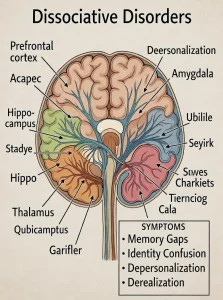Overview
Diagnosis
Diagnosis of dissociative disorders involves discussing your symptoms and ruling out any medical conditions that might cause similar signs. It often includes a referral to a mental health professional for an accurate assessment.
Diagnosis may include:
-
Physical exam: A health care professional will examine you, review your symptoms, and evaluate your medical history. Tests may be done to rule out physical causes of symptoms such as memory loss or detachment from reality — including head injury, brain disease, severe sleep deprivation, or substance use.
-
Mental health exam: A mental health specialist will discuss your thoughts, emotions, behaviors, and symptoms. With your consent, information from family members may also help in understanding your condition.
Treatment
Treatment for dissociative disorders depends on the specific type but generally involves psychotherapy and, in some cases, medication.
-
Talk therapy: Also known as psychotherapy, it is the primary treatment. The therapy focuses on helping you understand your disorder, identify triggers, and develop coping strategies. Over time, the therapist may guide you in processing past trauma safely once a trusting relationship has been built.
-
Medicine: There are no medications specifically designed for dissociative disorders. However, doctors may prescribe antidepressants, anti-anxiety, or antipsychotic medications to manage related symptoms like depression or anxiety.
More Information
-
Cognitive behavioral therapy
-
Hypnosis
-
Psychotherapy
Preparing for your appointment
Your doctor may start with a general health exam to rule out physical causes of your symptoms. You may also be referred to a mental health specialist. Bringing a family member or friend can help you recall information discussed during the visit.
What you can do before the appointment:
-
Make a list of symptoms, including any unusual behaviors or confusion you’ve noticed.
-
Note key life events, major stresses, or past traumatic experiences.
-
Gather details of your medical history, including mental or physical health conditions, and list all medications or supplements you take.
-
Prepare questions to ask your doctor.
Common questions to ask include:
-
What is likely causing my symptoms?
-
What are possible alternative causes?
-
How will you confirm my diagnosis?
-
Is my condition temporary or chronic?
-
What treatments do you recommend?
-
How will treatment progress be monitored?
-
Should I see a specialist?
-
Are there resources or websites you recommend?
What to expect from your doctor
During your appointment, your health care or mental health professional may ask questions such as:
-
What symptoms have you or your loved ones noticed?
-
When did these symptoms first appear?
-
Are there any memory gaps or time periods you cannot recall?
-
Do you ever feel detached from your body or as if multiple personalities exist within you?
-
How have your symptoms affected your daily life or relationships?
-
Have you had thoughts of self-harm or harming others?
-
Have you experienced physical or sexual abuse in the past?
-
Do you use alcohol or drugs?
-
Are you currently receiving treatment for any other medical or mental health conditions?
Being prepared with detailed answers helps ensure your doctor has a complete understanding of your situation and can recommend the best treatment plan.
Advertisement

